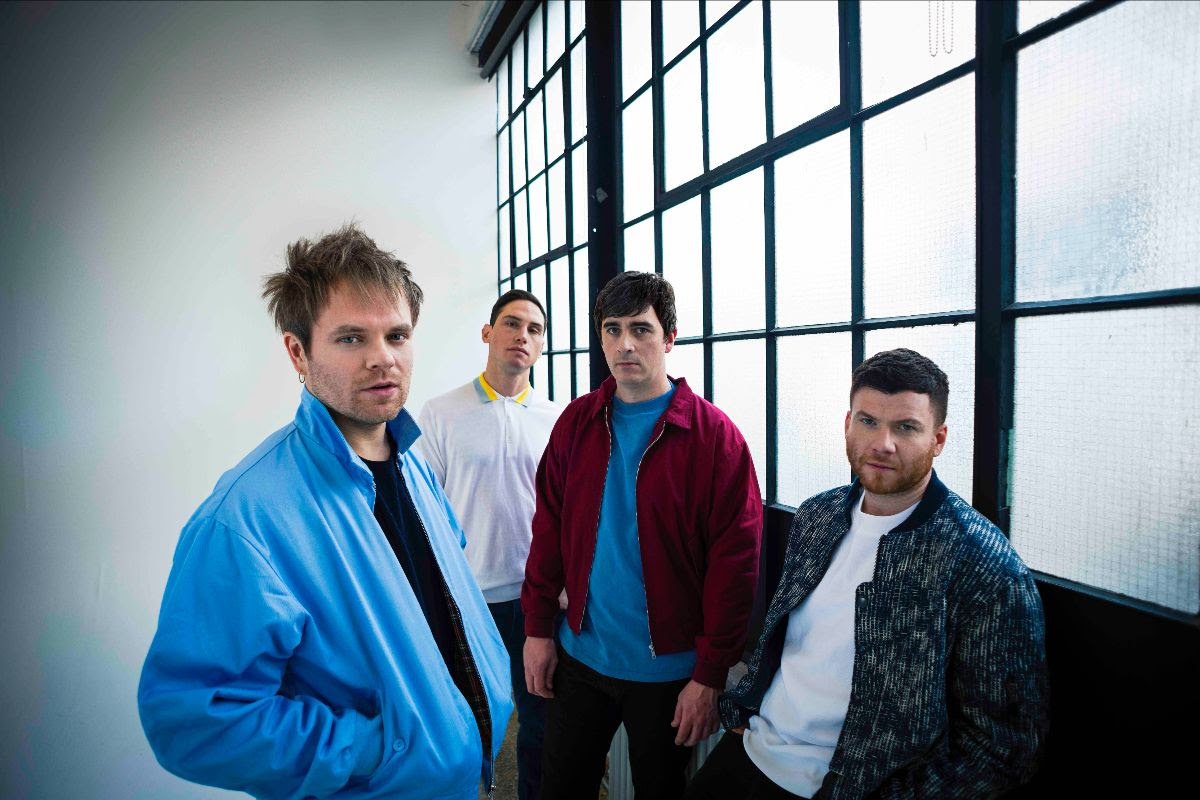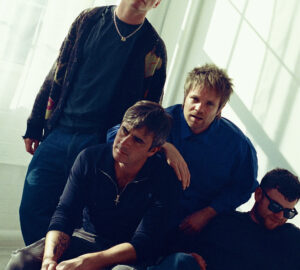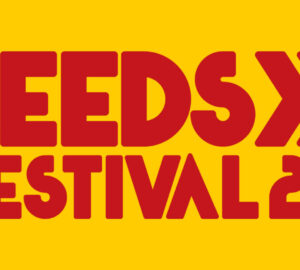Photo Credit: Derek Ridgers
When it comes to bands that change their sound with every release, Enter Shikari are among those who do it best. Their latest full-length, Nothing is True & Everything is Possible, comes as a perfect mix of their past five albums, while also laying down some new sounds, effectively paving way for the future. We caught up with frontman Rou Reynolds to talk about their new record, as well as his meditation livestreams and the upcoming online Five4Five Fest, which Enter Shikari are set to headline.
Okay, so, we’re here to talk about your latest album, Nothing is True & Everything is Possible. We reviewed it and it’s fucking spectacular – we gave it 10/10, so big up on that one, as well as for its debut at the #2 spot!
Thank you very much, cheers!
So, the album came out a little over three weeks ago. You say it’s the definitive Enter Shikari record, but in terms of songs, is there any song that you’d consider to be the “definitive” Shikari song, that you would recommend as a first listen to someone that’s not familiar?
Oh, god…it’s not an easy job being a fan of Enter Shikari, but then also it’s really not an easy job introducing other people, because all [of] the songs sound so different from each other, so it’s difficult to find one song that encapsulates everything that we do. I don’t know, even { The Dreamer’s Hotel }…it’s only one side of us, or a few sides of us…maybe THE GREAT UNKNOWN, maybe just start at track 1, fuck it!
Now, let’s talk about Elegy for Extinction for a bit. It was composed alongside George Fenton, and recorded with the City of Prague Philharmonic Orchestra, and you’ve mentioned the likes of Tchaikovsky and Vivaldi as inspirations on the composition side. When we reviewed it, we equated it more to contemporary composers such as Alan Silvestri for the more “positive” sounding part, and then Hans Zimmer for the more “ominous” part, would you agree?
Yeah, I suppose in terms of the way it’s structured, and the additional instrumentation, on top of the traditional orchestra, makes it have a modern feel, certainly. I think harmonically, the biggest influence is [Edward] Elgar – he’s one of my favourite composers, in terms of harmony, I think. It’s so simple, but so beautiful: like the chorale that comes in [at] one minute into the track, that’s very influenced by him. The intro is very influenced by “[The] Four Seasons”, [by Antonio] Vivaldi. Then obviously the third section is the “catastrophic” section, so I could see Hans Zimmer, I can see [Igor] Stravinsky, [Richard] Wagner. It’s very grand, it’s in your face, and kind of intimidating and disorientating.
At the same time, it also sounds like something you could hear in a Disney movie, such as The Lion King, because it’s got that grand, majestic feel to it, I mean.
Yeah, absolutely!
While we’re on the topic of songs on the album, there’s the two lighter tracks, satellites** and the pressure’s on. To us they feel kind of Redshift inspired, would you say that that’s the case, that they draw some sort of inspiration from Redshift? Especially true, in our opinion, for the pressure’s on, for the part where the guitar comes in, with “now this isn’t what I planned”.
Could do, yeah. It really concentrates on the melody, those songs. the pressure’s on is probably our most minimal song ever – it’s very spacious, especially the first half. There isn’t really any guitar, it’s just very simple – synths; it’s all about the vocal[s], it’s all about the melody, and getting across that kind of more sombre style on the album.
In that sense, now that you mention it, we can see it being similar, in a way, to Shinrin-Yoku, in the minimalism sense.
Yeah, absolutely! With this album, a lot of the tracks were sort of inspired by previous albums, because I wrote Dear Future Historians, the book of all my lyrics and essays, describing the intentions and the meanings and inspirations behind the lyrics, and that was the first time that I’d looked back throughout Shikari’s career, our journey, our history. That’s why we wanted to make a definitive record that is inspired by each one of our albums, and covers the full spectrum of the sounds that we have covered before.
We’d say it definitely gets that job done. It’s the most comprehensive album of yours that covers all grounds that you’ve covered before, but also new ones. So again, big up on that one! [laughs]
[Laughs] Thank you!
You’ve previously mentioned that you went into the studio with over fifty song ideas. From those song ideas that didn’t make it to this album, could we expect to see them later down the line – perhaps in another Hospitalized type of compilation, or maybe a sequel to Nothing is True?
Yeah, absolutely! I think anything that doesn’t make the album, it’s not that we didn’t consider it good enough, it’s usually because it just hasn’t been developed enough in time to be considered. It’s usually the ones that are most developed that we’re most excited about, so we continue developing [them]. I should say first, everything that we’ve ever made goes into a vault, and I always come back to it, and I may feel more inspired for a particular track that never got developed enough, but now I feel like “Oh, I know exactly what that needs to be developed.” Some tracks can take years to get right – a good example of that is THE GREAT UNKNOWN. That piano section that the album starts with was a piano ostinato that was on The Mindsweep sessions, and it started a completely different song, but it just didn’t feel right for The Mindsweep, so it just got put aside. Then I went back and took that piano and made it something quite different, so that’s how THE GREAT UNKNOWN was born. So yeah, I think we’ll always use everything, somehow.
That’s good! That also explains why some people thought that the piano intro sounded more like The Mindsweep rather than Take to the Skies.
Right, yeah.
And finally about the album, before we move on – you’ve said that { The Dreamer’s Hotel } is the track that you look forward to playing live the most out of all of them. In terms of just the tracks themselves, what is your favourite performance, or lyric section on this album?
Ooh, wow…that’s so hard, I’m so happy with this album. I think Marionettes is maybe, well, Marionettes I&II are songs that haven’t been talked about that much, because they’re more towards the end of the album, and they’re kind of difficult. They’re long journeys of songs, they’re quite sort of ‘prog rock’. I’m really proud of that one, because it’s so diverse, it’s like an opera – it goes through so many emotions, and it plots this storyline of these marionettes, these puppets discovering their strings, discovering they’re being controlled. It’s a very emotive, powerful song, really, that echoes a lot of sentiments that are happening right now in the world. So yeah, I reckon performance-wise, I’m really happy with that one. I spent so long on the very introduction section, where there’s the trumpet, because it’s almost like a James Bond beginning, or a cooler reference would be that guy, what’s his name…was it Enico Morricone?
Ennio Morricone!
Yeah, yeah! It sounds like a lot of his soundtracks.
Yeah, like Ecstasy of Gold, for instance.
Yeah…we just wanted to make sure that the intro was right. We didn’t want it to seem cliched, or pastiche – wanted it to seem kind of odd, and a bit disconcerting. There were a lot of atmospheres that we wanted to get exactly right in Marionettes, so yeah, I’d say I’m really proud of that one. Lyrics? Who knows… I mean, I love Crossing the Rubicon, there’s so many references in that. { Dreamer’s Hotel } is the most fun lyrics, I had a lot of fun making that one. It was really difficult to get that right, I remember the lyrics taking ages for that one.
[Singing] “Nuance ain’t nothing but a nuisance!”
[Laughs] the king was a really difficult song to get right, as well.
Yeah, we know, we heard the story with it almost not making the album, and having five different choruses, and a far-from-normal amount of snares on it, too. Also, about Marionettes, we reckon you’re really proud about that really high note at the end of Marionettes II.
[Laughs] Yeah, that was weird – that was actually an ad-lib. I’d made the main vocal on that section, and I was like “I think it needs some falsetto backing vocals, as well.” So, I just did two passes, one in each ear, just to demo the idea, and then I thought I’ll do them properly later. Then I sort of forgot about it, then we got so used to hearing these quite rough, like [demonstrates rough, high pitched scratchy falsetto noises], y’know, “not quite perfect” backing vocals. When I sat down near the end, I was like “Oh shit, I need to re-do the vocals properly!” and the guys were like “No, no, leave it! Leave it how it is! It has a rawness, it has like a delicate, shakey human nature to it.” The lyric “Truth hurts, but now you know truth frees”, it’s quite powerful.
Powerful and humane, right.
Yeah. We can all think of times that we found out a truth that was horrible, but we’re also kind of glad we found it out, because we’re now more in control, a bit more knowledgeable. So it’s this bittersweet feeling of feeling broken and shocked by the truth, but also glad that you now know the truth. We just thought we’d keep it that sort of shaky style. I think it’s the highest note I’ve ever sounded on a Shikari track.
Yeah, that’s probably the case. One more quick question about Marionettes, before we move on. A lot of people are saying that it would’ve worked better as one whole song. Can you explain why you felt the need to split it up when it becomes Marionettes II?
It’s a very clear point in the narrative, where the marionettes’ focus changes. In part one, they’re discovering their strings, so it’s shock, fear, disorientation. The second half of the track is where they’ve come to grips with what’s happening, they’ve come to grips with the fact that they’ve got strings. Now their focus has changed to determination: “Okay, we need to climb these strings, we need to find out who’s controlling us, we need to take our power back, we need to find the truth.” It’s a real big shift in narrative and the passions of the Marionettes. It could’ve been one track. A lot of the album is structured like it’s a classical album, like a load of classical pieces in an album. So if it was a classical piece, it’d be split up; if it was in an opera, they’d be split up. I can’t really think of what the complaint is, apart from if you’re listening to it on shuffle, and you’re like “Shit, now I have to go and find number two!” so that must be really annoying. But otherwise, for people who are listening to it as an album, it’s fine, it just carries on. No-one knows it’s a different track, it just blends straight in.
Yeah, that’s also one of its strengths, that transition is so smooth.
I wanted to really differentiate the two tracks because there’s such a different atmosphere in the marionettes’ headspace.
With NIT&EIP, this was your first time taking the reins as a full-on producer and overseer of the album. Having learned all of these new skills and having had this experience, would you ever consider going back through your catalogue, back to your roots, revisiting old songs, perhaps even re-recording them, either for the purpose of having a new mix/master, or for rewriting any lyrics that you now think would sound better?
No, not at all. I have no desire to do that. What drives me is creativity, pure creativity, having a new idea and following it through. I have no desire to go back and change anything. It’s almost like it’s a diary, the music we made in 2007, that was the music we made in 2007, I feel no need to change it.
Some people would consider that, for example, Sorry, You’re Not a Winner, or something off Common Dreads would sound better with a new production, but we agree with you. You should just leave everything that was in the past as is, sort of as a testament of where you started from and how far you’ve come up until now.
Yeah, I’m sure we could mix it differently, remaster it, make it sound much more powerful, but I don’t know, I just have no desire to do that, it doesn’t excite me.
It’s understandable, really. Now let’s switch gears and talk about something more recent and actual. Alongside Don Broco, Enter Shikari have been announced as headliners for the new, online Five4Five Fest. Can you give us more information about it, how you expect it to feel compared to a normal festival show, and maybe even a quick sneak peek of what you have prepared for that show?
Well, I think it’s all going to be quite minimal. I think everyone’s doing two or three tracks, all the bands. But yeah, it should be fun. I’m not sure what we’re gonna do yet, we haven’t decided, but we’ll probably do a track off the new album, and then maybe a track off The Spark, and then an older track or something? I’m not sure.
Or maybe a Quickfire Round?
Oh, yeah, maybe! [laughs] But yeah, it should be fun, obviously raise some money for our health service, looking forward to it.
While we’re on the topic of the Quickfire Round, how do you see it being changed for the upcoming tour, in the event that everything goes to plan and it actually happens this year? Do you see you guys changing it and including other songs?
Yeah, I would’ve thought so. Each tour, or each year, we like to update it – or each six months, even – slightly change it. There’s enough songs that are in the range of 160-180BPM, so we can mix it differently and mix it up.
You’ve started doing some live streams on Instagram, particularly the meditation one, called Here, Now, Together, if we’re not mistaken.
Yep.
Could you provide some insight as to what led to its formation, and what made you say “Okay, I’m going to do some meditation livestreams”?
Well, as soon as the lockdown happened, everyone started live streaming, and I just didn’t want to do the normal thing where, you know, people just have their phone and they just stare at the screen and they’ll answer questions – I find them quite boring. Obviously, if they answer interesting questions, then it’s not boring. I just felt like I wanted to do something just a bit different, and that would maybe offer some people a bit of relief from the stress of the whole situation. I’ve been using mindfulness meditation for about six years now. I’ve learned so much, I’ve had so many great teachers, some great experiences. I know that there’s a lot of people out there who it would help, it would genuinely give them a better sense of self control and calm. So, yeah, I just thought I’d do some live mindfulness live streams. At the moment, I don’t think there’s ever been such a shared sense of unity, because we’re all living through various types of lockdowns and social distancing. All of our lives have changed in some way, so we’re all feeling a similar sense of – a little bit of fear, a little bit of worry about the future, a little bit of, perhaps, anxiety about our health, or our loved ones’ health, maybe even boredom from just being inside all the time. We’re all feeling these things, and that helps us feel connected to each other. I think meditation is often thought of as very solitary, as a very self contained thing, something that you practice by yourself, with your eyes closed, you’re in yourself. I’ve done a lot of reading the last few years, it’s a communal practice as well, and the sense of community is really important. So I thought that was another good reason to do it now, when everyone is probably more stressed than they’ve been for a while, be it through finances, be it through health, whatever. Mindfulness meditation has been scientifically proven to help you in so many ways, and one of the ways is it boosts your immune system. When we’re stressed, our immune system is lowered and kind of debilitated in some way, so to be able to use mindfulness to hopefully help your immune system is a good plan. If we have a high immune system, it may help us with the various infections [brought by] coronavirus or other illnesses. Yeah, I just thought it’d be a good thing to do, and a bit of fun really.
Thank you very much for this, and for this masterpiece of an album!
Thank YOU!
It was great talking with you, and we look forward to seeing you again, the Five4FiveFest, and obviously more Enter Shikari shows, because we severely miss them and we’re in concert withdrawal [laughs].
[Laughs] Yeah, me too, me too…thank you so much for your support, and thanks for having me today! I hope you have fun, take care, stay healthy, stay safe, as everyone’s saying!
You too man!
Take care, see you later!
Take care, bye!
Enter Shikari‘s new album Nothing Is True & Everything Is Possible is out now, available to stream or purchase HERE.





